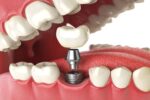It’s common knowledge that even if you brush twice a day and floss daily, if your diet regularly consists of things like Lays all-dressed chips, Coca Cola and Captain Mo’s, you are likely jeopardizing your oral and overall health. Your diet can have just as much of an impact on your oral health and your oral hygiene routine.
Plaque forms on our teeth after eating or drinking. Sugar is a fuel source for plaque-creating bacteria. This combination increases acidity in your mouth, and is hard on your teeth and gums.
The team at your friendly neighbourhood dentist in SW Calgary, Heritage Park Dental, dive into the do’s and don’ts regarding nutrition and dental health, and the reasons for them.
Foods That Promote Dental Health
Maintaining good dental health can involve more than just brushing and flossing. Your diet can also contribute to strong teeth and gums. You can improve your oral health before your next dental checkup near you by consuming foods like:
Lean Protein– Poultry, eggs and fish supply protein, which is important in maintaining healthy gums.
Crunchy Fruits and Vegetables – Foods like apples, carrots and celery can help produce saliva, which neutralizes acids and helps remove food particles.
Leafy Greens – Spinach, kale, and other leafy greens are chock-full of vitamins and minerals that, much like lean protein, also play a big role in maintaining healthy gums.
Nuts and Seeds – Almonds, walnuts, and sesame seeds are good sources of minerals that are essential for healthy teeth.
Dairy Products – Milk, cheese, and yogurt are excellent calcium sources, which help strengthen tooth enamel.
Green and Black Tea – Both teas contain polyphenols that can help suppress the growth of bacteria responsible for gum disease and tooth decay.
Sugar-free Gum – Chewing sugar-free gum after meals can stimulate saliva production, which aids in remineralizing tooth enamel.
It’s important to note that while these foods are beneficial for dental health, they are not a replacement for regular oral hygiene practices. Eating healthy in addition to practicing good oral hygiene are necessary for optimal oral health.
Food and Drinks That Can Harm Dental Health
Foods
The best rule of thumb is to limit the consumption of sugary and acidic foods and beverages, as they contribute to tooth decay. Common sugars to look out for are desserts such as cakes, pies, cookies and candy.
But even when looking at healthier alternatives for sugary snacks like dried fruits such as raisins, while they are much healthier, they can consist of higher volumes of sugar than expected. They also tend to be quite sticky, allowing sugars to cling to your teeth.
Carbohydrates can be an issue as well. When eating them, carbs in food break down into sugars. So just as with any other sugar, when it combines with mouth bacteria, it can increase mouth acidity. The common carbs to watch out for are bread and fried starches like chips or fries. Regular consumption of generally acidic foods such as tomatoes, oranges and lemons can also lead to oral health issues, including cavities and canker sores.
Drinks
On their own, coffee and tea can be healthy choices. However, it is common for people to add sugar to their morning brew. Regular coffee consumption can lead to teeth staining. Caffeinated coffee and tea can cause dry mouth, which isn’t helpful for dental health. If sugar is decreased or not added, and plenty of water is drunk, these adverse effects can be minimized.
Alcohol is a widely consumed type of beverage with adverse effects on oral health. Alcohol dehydrates which causes dry mouth decreasing saliva production, which can contribute to tooth decay; long-term use can lead to gum disease and increase your risk for mouth cancer.
Lastly, while sports drinks are marketed to replenish you after exerting yourself physically, sugar is a main ingredient. So while it can restore your glucose reserves, regular consumption can eat away at your tooth enamel.
Nutrients and Their Effect on Dental Health
Calcium is one of the biggest players in dental health. It is why dairy, leafy greens, nuts and seeds are highly suggested. Leafy greens also contain folic acid, which promotes gum health even though it’s an acid. Nuts and seeds are also good for magnesium and phosphorus, which are essential for good teeth care.
If you are looking for a new dental clinic near you to receive dental checkups in SW Calgary, Heritage Park Dental is always welcoming new patients of all ages. We take the time to answer all of your questions and concerns, especially ones that involve practicing good oral hygiene. You can always inquire about nutrients that are good for your teeth and we’ll be happy to guide you on the right path to good oral care.
The Role of Water in Dental Health
Water is a huge help for oral hygiene. It helps remove food particles from our teeth and neutralizes acids and bacteria. Water also dilutes sugars while also keeping you hydrated, increasing saliva production. Fluoridated water helps strengthen tooth enamel and rebuild any soft spots that may have been created. Fruits and vegetables that are high in water content can also help. The only water that is bad for your teeth is ice. Chewing on hard substances like ice can lead to enamel damage and potential dental emergencies.
The Impact of Nutrition on Overall Health
Nutrition plays a crucial role in overall well-being. We are better off when our food and beverages provide essential nutrients to our bodies. Adequate nutrition ensures our bodies have enough energy to carry out daily activities and maintain optimal metabolic function.
Ways in which nutrition impacts overall health are:
Energy and Metabolism – Carbohydrates, proteins, and fats provide the body with energy.
Growth and Development – Proper nutrition is essential for growth and development, particularly during childhood and adolescence. Proteins, vitamins and minerals are vital for bone growth, muscle development, and our organs and tissues.
Immune Function – Adequate nutrition plays a key role in maintaining the body’s defenses against infections and lowers the risk of chronic diseases, including heart disease, diabetes, obesity, cancers, and cardiovascular conditions.
Mental Health – Emerging research suggests that nutrition influences mental health and brain function. Vitamins, minerals and fatty acids have been linked to improved mood, reduced risk of depression, and better cognitive function.
Digestive Health – The right nutrition leads to healthy digestion, which prevents conditions such as constipation, diverticulosis, and hemorrhoids. Additionally, a balanced diet supports the growth of beneficial gut bacteria, which impacts overall well-being.
Tips for Maintaining Good Dental Health Through Nutrition
One interesting tip is to eat more meals instead of snacking throughout the day. This causes less harm to teeth because more saliva is produced during a meal. Saliva is important for keeping acids and bits of food lingering on your teeth and gums.
A diet high in nutritional value is rich in fruits, vegetables, whole grains, lean proteins, and healthy fats will contribute positively to one’s overall physical wellness, including oral health. Water is the best beverage for oral wellness, especially if it is fluoridated. However, drinks that have little-to-no sugar are okay. Cutting out or minimizing alcohol also contributes to better oral care.
Looking For a Family Dental Clinic Near You?
Is your family looking to receive dental checkups in SW Calgary? Contact us now for more information or to book your consultation!
Heritage Park Dental
Phone – (403) 259-5123
Email – hpdental@shaw.ca
FAQ
Can a lack of proper nutrition contribute to the development of oral cancer?
Lack of proper nutrition alone may not directly cause oral cancer. However, it can contribute to weakening one’s system overall. This can compromise oral health as the body cannot fight off infection and disease, so any system is at risk, including your oral system.
What is the role of water in maintaining good oral health?
It washes away acids and sugars hanging around in teeth.
Staying hydrated keeps the mouth producing protective saliva.
Fluoridated water keeps tooth enamel strong and helps ward off bacteria.
How do foods high in calcium and vitamin D benefit our dental health?
Calcium – helps the formation of tooth enamel.
Vitamin D – has anti-inflammatory properties that promote healthy gums.
Calcium and Vitamin D – Vitamin D aids in the body’s calcium absorption. Working together, they strengthen your teeth, gums and jaw bones that hold your teeth together.









